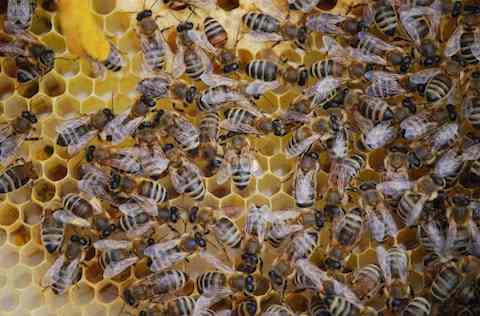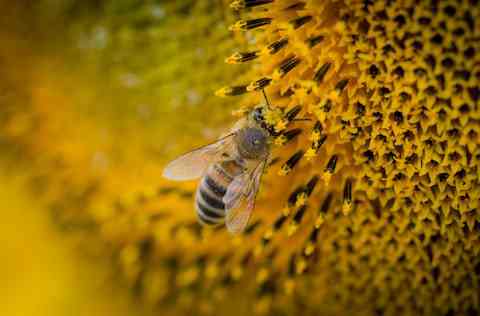Biblical Meaning of Bees
Bees may appear in the Bible as symbols of productivity and prosperity. In some passages, they are seen as a sign of God’s divine providence. Bees are also symbolic of hard work and diligence, with their industrious nature characterized in the scriptures. Read on about the very significant biblical meaning of bees!
The bee has always enjoyed an excellent reputation, and in the most ancient biblical times, the sweetness of its honey and the ardour of its work were already extolled. We find more than 60 direct or indirect references to this little insect in the Old Testament, and the New Testament mentions it about John the Baptist and in the Apocalypse.
The Fathers of the Church associated continuously the bee with the divine verb, making it an emblem of Christian virtues, and the Middle Ages will abound in images that represent it with its hive in a metaphor of society.
The bee, hymenopter of the apoid family, is among the oldest known insects in terrestrial life. Their characteristics quickly earned them to appear in the Bible on numerous occasions, making the bee a privileged animal of the biblical bestiary.
Bees portray multiple characteristics that Christians should aspire to:
- They are diligent and purposeful in their work.
- They respect leadership and serve their hive.
- They work as a team.
- They live in peace and harmony, but if attacked, they are strong and fight united to defend themselves.
Bees represent tenacity, determination, and wisdom.
What does the Bible say about bees?
All the biblical references have in common and underline this idea of constant work and abundance that this small insect with a striped abdomen represents.
The bee, especially with its hive, is the animal evoked or most frequently represented in biblical texts as a metaphor for human society that makes the greedy activity of its workers a model of virtue. A virtue also accompanied by a source of unparalleled abundance, an abundance as rich as beautiful and sweet, in the image of the present in Paradise.

For example, Deuteronomy describes the Promised Land as a “honey country“; for the book of Exodus, it is the promise to Israel of “a land that flows with milk and honey,” an expression that reappears several times in the Old Testament and attests to the importance of the product of the hive in those ancient biblical times.
The Psalms also describe the Word and the judgments of God as “more attractive than gold than finer gold; sweeter than honey, more than honeycomb juice.” Thus, honey created by bees is considered to bring life, but also clairvoyance, especially during difficult times.
“My son, eat honey, because it is good, and the drippings of the honeycomb are sweet to your taste.”
Proverbs 24:13

Recall that Jonathan in the First Book of Samuel, unaware of the prohibition of eating imposed by Saul, tasted wild honey and “his eyes lit up.” Life, clairvoyance. will honey be a divine food as earthly as spiritual?
The bee has always enjoyed an excellent reputation and in ancient biblical times the sweetness of its honey and the ardor of its work were already extolled. We find more than 60 direct or indirect references to this little insect in the Old Testament, and the New Testament mentions it in connection with John the Baptist and in Revelation.
The Fathers of the Church constantly associated the bee with the divine verb, making it an emblem of Christian virtues, and the Middle Ages will abound in images representing it with its hive in a metaphor for society.
Bees in the house meaning
As you know, these insects are known for their great teamwork, for being supportive and hard-working, so if they come home it is because they are announcing that soon your economy will increase, although that will also mean that you will be with more work and responsibilities, congratulations!.
Bees at home: do you have a honeycomb?
If you have ever seen the house of bees, you know that they have a hexagonal shape, which symbolizes the union of divinity with the earthly through the heart, since your actions are in accordance with the common good, amazing!

Bees at home: numerical value
This insect is represented with a number 6, which, like its honeycomb, refers to the hexagon and the letter of the Hebrew alphabet Vav, which represents the need to maintain the “I am” with the divine will, because only then can you obtain the spiritual peace that will fill your passage through life with sweetness.
Bees at home: honey is magic
It is due to its connection with divinity and earthly things that the fruit of the work of bees is used for magic rituals, particularly to bring sweetness to relationships and situations that arise in the life of a person, just be careful. Do not confuse them with wasps, as they mean the opposite of these, which are only an exception to the rule, since insects are generally related to low energies.
The bee to the aid of the saints
Although the life of Saint John the Baptist has always been described as very austere, the Gospel according to Saint Matthew describes the day to day of this relative of Jesus in this way: “John had a robe of camel hairs and a leather belt, and fed on locusts and wild honey.”
In fact, in the biblical texts, the bee supplies the saints with almost everything necessary for their real life. And, for this source of life, Gregory of Nisa would use the metaphor of the bees flying over the meadow to evoke the words inspired by God, each releasing those flowers to receive from her the nectar and keep it in her heart without using her stinger.
In addition to a natural food source, bees are also in the Holy Scriptures privileged to release the divine verb.
It cannot also be forgotten that Saint Ambrose of Millán, from his childhood, was also linked to the bee. Newborn and in his crib, it is said that a swarm of bees covered the child’s face and that they even entered his mouth.
After the bees moved away, leaving the child unscathed to his father’s great surprise, he exclaimed: “If this child lives, it will be something big.” By this episode, Saint Ambrose of Milan would become the holy protector of beekeepers.
The Bee in the Bible – A double faceted animal
However, although the Bible praises on many occasions, the exquisiteness of the Word, sweet as honey from bees, indeed, the sting of these insects can also cause significant pain.
This would highlight Saint Bernard when comparing Christ with the bee for its sweetness, but also for its sting, which will cause a bitter sting to those who have not followed his Word and will submit to his judgment.
The book of Revelation also seeks to underline this ambivalence: “I took the little book from the hand of the Angel and ate it: in my mouth, it was sweet as honey, but when I finished eating it, it became bitter in my stomach.” Bee, source of sweetness and life, but also cause bitterness.
Decidedly, the bee presents in the biblical texts with a striking contrast this source of wealth and incomparable life, a heritage as vital as spiritual that corresponds to protect us from the foreseeable disappearance of these small insects so loved in the Bible.
Biblical references to this insect usually have to do with wild bees. The description of Canaan as a “land that flows with milk and honey” indicates that since ancient times there were many bees in that land. ( Ex 3: 8 ) The warm climate and the abundance of flowers continue to make it an ideal land for bees, so beekeeping is very popular today. Of the more than twenty thousand species of bees that are known, today the most common subspecies in Israel is a dark bee called Apis mellifica syriaca.
The honey Jonathan ate during a military campaign was in the forest, and the hive was likely in a hollow tree. ( 1Sa 14: 25-27 .) The wild bees of the Jordan Valley supplied much of the food of John the Baptist. ( Mt 3: 4. ) Bees not only make their hives in trees, but also other hollow cavities, such as rock crevices and walls. ( De 32:13; S 81:16 .)
The account of Judges 14: 5-9 has raised some questions. Samson had killed a lion, and when he returned, he found “a swarm of bees in the dead body of the lion and honey.” The strong aversion of most bees to dead bodies and carrion is well known.
However, the story says that Samson returned “after some time” or, according to the original Hebrew text, “after days,” a phrase that can refer to a period of up to one year. (Compare 1Sa 1: 3 [in the Hebrew text the expression “from year to year” is literally “from days to days”]; also compare to Ne 13: 6.) The elapsed time was enough for insects, birds or other scavengers to consume most of the meat, and for the intense sun to dry out the rest.
It also proves that the fact that the swarm of bees had not only formed its hive in the dead body of the lion but that it had also produced quite a lot of honey.
The ferocity of an agitated swarm of bees is used to describe the way the Amorites threw Israelite forces out of their mountainous domain. ( De 1:44 .) The psalmist compares the enemy nations with a swarm of bees that attacks and says that they were kept at a distance by faith in the name of Jehovah. ( Sl 118: 10-12 .)
The prophet Isaiah predicted the invasion of the Promised Land graphically by the armies of Egypt and Assyria, resembling his troops to swarms of flies and bees to whom Jehovah God figuratively ‘whistles’ to go and settle on torrential valleys and crevices of the boulders.
( Isa 7:18, 19 ) This ‘whistling’ does not imply that this is a real practice of beekeepers, but only indicates that Jehovah attracts the attention of the aggressor nations to the land of His people.
Two women from the biblical record were called Deborah (meaning: “bee”): Rebekah’s nurse ( Ge 35: 8 ) and the prophetess who cooperated with Judge Barak in the defeat of Canaanite king Jabin. ( Thu 4: 4. )
In conclusion: Biblical Meaning of bees
Bees in the bible are symbols of productivity and prosperity, hard work and diligence, an emblem of Christian virtues. They represent abundance as rich, beautiful, and sweet as Paradise. But these are also powerful creatures whose sting can cause significant pain and was compared to the power of enemy nations like a swarm of bees that attack. As Christians, we are encouraged to be more like bees, work united as a team with the church, the body of Christ, with perseverance, wisdom, and strength, and we will reap sweet rewards from our Lord.
We hope you found this post helpful! We recommend you also read:
What Does It Mean When You Dream About Bees?
If you are interested in BIBLICAL MEANINGS, SPIRITUALITY and are still asking yourself questions such as: what do dreams mean, we invite you to discover all the articles we have for you in our sections of:
You May Also Like:
ᐈ Biblical Meaning Of A Sunflower【 2022 】 (redargentina.com)
ROSE OF SHARON Symbolic & Spiritual Meaning 【 2022 】 (redargentina.com)


This information is incorrect………………John the Baptist didnt eat lobster………he ate locusts and honey. Im sure other information is incorrect also.
Shaunah. Thanks for the correction.